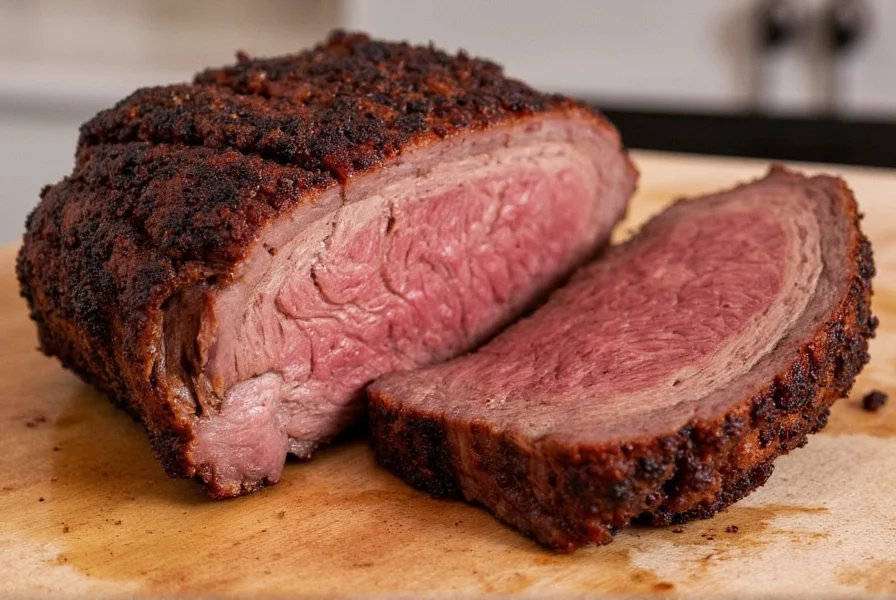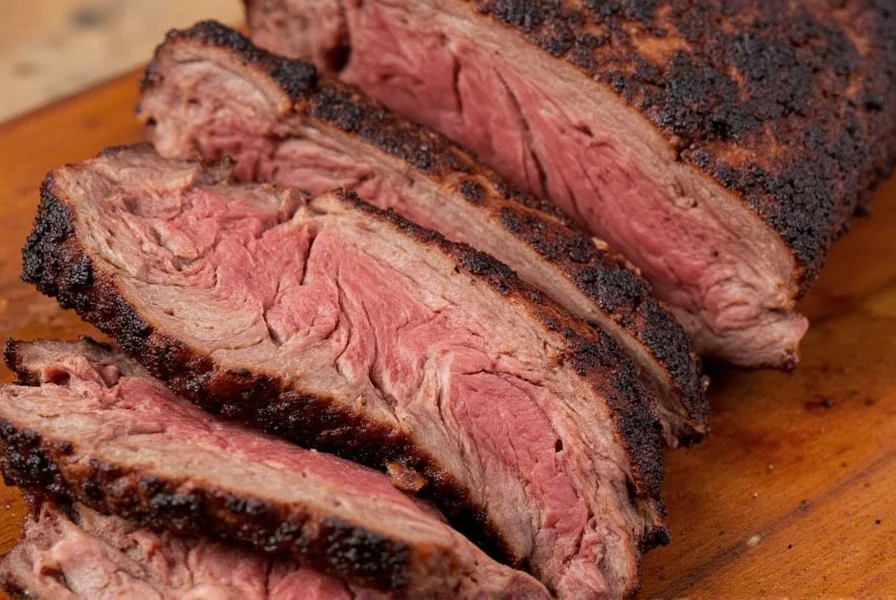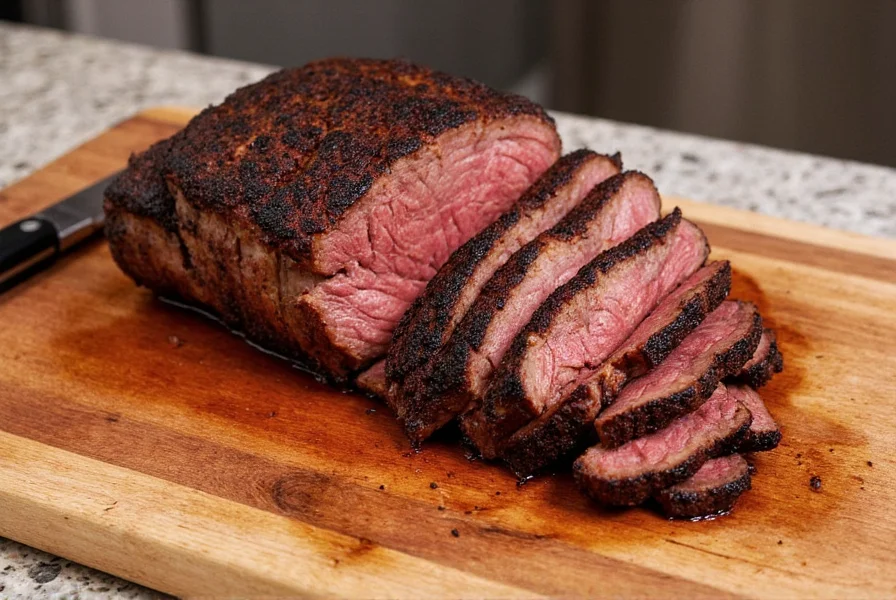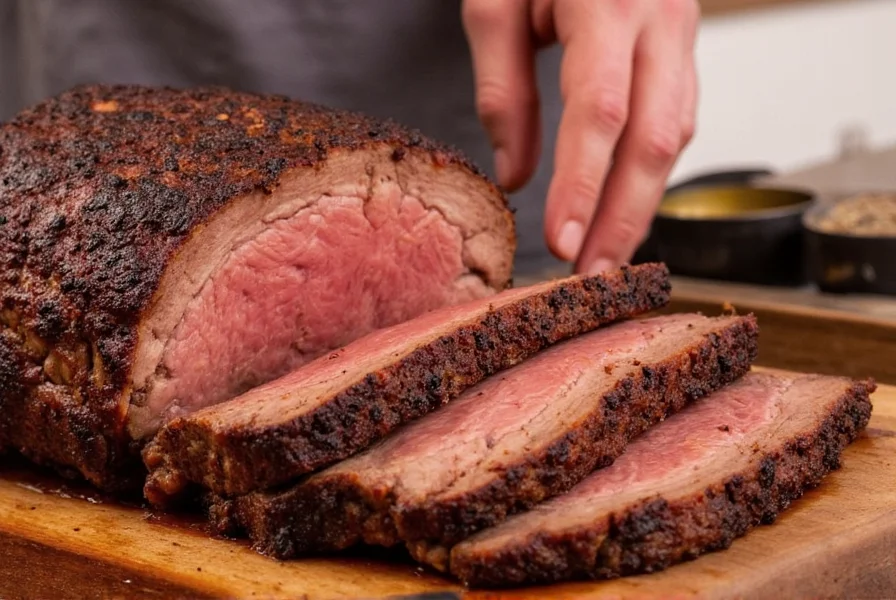This easy oven brisket recipe delivers tender, juicy results with minimal effort. No smoker required! Follow these simple steps for restaurant-quality brisket at home.

Ingredients
- 10-12 lb brisket (flat cut preferred)
- 2 tbsp smoked paprika
- 1 tbsp brown sugar
- 1 tbsp garlic powder
- 1 tbsp onion powder
- 1 tbsp black pepper
- 1 tbsp chili powder
- 2 tsp salt
- 2 tbsp olive oil or mustard
- 1/2 cup beef broth or apple juice (optional)
Step-by-Step Instructions
- Trim and prepare: Trim excess fat to 1/4 inch thickness. Pat brisket dry.
- Season: Rub with olive oil or mustard, then evenly coat with spice blend. Press firmly into meat.
- Rest: Let sit at room temperature for 1 hour.
- Preheat oven: Set to 250°F (121°C).
- Roast: Place brisket fat-side up in roasting pan. Add broth/juice if using. Seal tightly with foil.
- Cook: Bake 6-8 hours until internal temperature reaches 200°F (93°C) and probe-tender.
- Rest: Remove from oven. Let rest 30-120 minutes before slicing.
- Slice: Cut against the grain into 1/4-inch thick slices.
| Cut | Description | Best For |
|---|---|---|
| Point Cut | Fattier, more marbled, with pronounced beefy flavor | Pulling, shredding, or making burnt ends |
| Flat Cut | Leaner, uniform shape, easier to slice cleanly | Slicing and serving whole |
Why This Method Works
Low-and-slow cooking (250°F) transforms tough collagen into gelatin, creating melt-in-your-mouth texture. Wrapping in foil traps moisture while allowing connective tissue to break down evenly. This approach guarantees consistent results without a smoker.
Spice Blend Customizations
- Tex-Mex Twist: Add 1 tsp cumin + 1 tsp coriander
- Asian Fusion: Replace brown sugar with 1 tbsp Chinese five-spice + 1 tbsp sesame oil
- Sweet Heat: Use maple sugar instead of brown sugar
Buying Guide

| Factor | What to Look For | Why It Matters |
|---|---|---|
| Fat Cap | At least 1/4" thick | Keeps meat moist and flavorful |
| Marbling | Visible streaks throughout | Ensures tenderness and richness |
| Grade | USDA Choice or Prime | Better flavor and texture |
Serving Suggestions

- Juicy Cornbread – Soaks up flavorful juices
- Smoked Gouda Mac & Cheese – Creamy meets smoky
- Grilled Vegetables – Adds freshness and crunch
- Classic Coleslaw – Balances richness with tangy crispness
FAQ
How do I know when my brisket is done?
Internal temperature should reach 195-205°F, but temperature alone isn't enough. The brisket should feel like Jell-O when probed with a thermometer or skewer, and a fork should slide in with almost no resistance. This "probe tender" stage is more reliable than temperature alone.
Can I cook brisket without wrapping it?
Yes, but you risk drying it out. Wrapping in foil or butcher paper creates a steam environment that breaks down connective tissue more effectively. For optimal tenderness, wrapping is essential.
Do I need to flip the brisket while cooking?
No! Keep it fat side up throughout cooking. Flipping isn't necessary in a steady-temperature oven and can cause heat and moisture loss when opening the oven.
Can I cook brisket at a higher temperature to save time?
You can, but you'll miss the full breakdown of connective tissue. The magic happens between 195-205°F over many hours. Low and slow (250°F) is key for optimal tenderness.
How long should brisket rest after cooking?
At least 30 minutes, but up to 2 hours is better. This allows juices to redistribute throughout the meat for cleaner slices and maximum tenderness.
What's the best way to slice brisket?
Always slice against the grain (perpendicular to muscle fibers). The grain direction changes between point and flat cuts, so adjust slicing direction halfway through. Use a sharp carving knife for 1/4-inch thick slices.
Can I make this recipe with a smaller brisket?
Absolutely! For every pound under 10 lbs, reduce cooking time by 45-60 minutes. A 6-8 lb brisket needs ~4-5 hours at 250°F. Always check for probe tenderness rather than relying on time alone.











 浙公网安备
33010002000092号
浙公网安备
33010002000092号 浙B2-20120091-4
浙B2-20120091-4